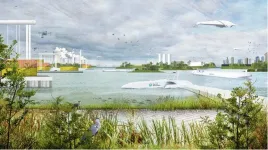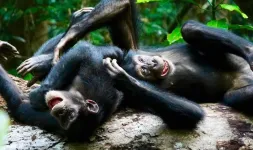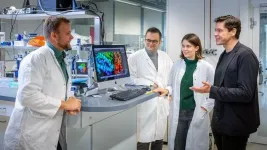(Press-News.org) In Nature Partner Journals, ten researchers advocate the use of imagination in tackling the climate crisis. They focus specifically on urbanising river deltas, which are of great social and economic importance and highly vulnerable to climate change. "We scientists should not merely outline doomsday scenarios," says Professor Chris Zevenbergen. "Create a vision for people to believe in and work towards.”
From doomscenarios to desired outcomes
Due to the climate crisis, urban river deltas are facing hazards such as rising sea levels, extreme weather events, and soil subsidence. Prosperous regions like the Netherlands are facing increasing costs and complexity for improving systems. Deltas in low- and middle-income countries additionally struggle with rapid urbanisation and limited resources. Traditional models are often insufficient to prepare deltas for our unpredictable future, necessitating more flexible approaches.
"Fortunately, the scientific community is already showing a greater focus on optimism and visions of the future, which helps to inspire and motivate people." According to Chris and his co-authors, scientists should more often use imagination and ‘design-based research’. "Ask the wider society: what do we want our country to look like in 100 years? What do we really care about? And then visualise possible futures." In this way, we encourage civic engagement and make climate adaptation both tangible and motivating.
"Ask the wider society: what do we want our country to look like in 100 years? What do we really care about?"
Inspiration from the Netherlands
Netherlands can serve as a role model for deltas worldwide, according to the authors. ‘’Take for instance Johan van Veen, visionary designer of the Delta Works," says Chris. "Johan was not thinking in years, but in generations. He had deep knowledge of natural processes such as sedimentation. And when the 1953 North Sea Flood struck, he had an appealing vision of the future ready at hand." Or consider the recent Room for the River programme, which applies natural solutions to increase the capacity of rivers while simultaneously improving biodiversity.
These words of praise must come with a caveat. Chris: “Many Dutch people considered the Delta Works a permanent solution, but according to Johan they were always meant as a necessary step in a process. Today, we need a new long-term vision.” Fortunately, work is underway on new visions for our coastal areas, including three scenarios for 2100. “Do we want to preserve our current coasts, flexibly adapt to change, or give way completely to the rising sea? This is how we use the power of design and imagination!”
"Johan van Veen did not think in years, but in generations; he had deep knowledge of natural processes; and he had an appealing vision for the future."
Measures for science, policy, and education
The authors offer clear advice to scientists, policymakers, and universities: strengthen the role of design in delta management. Scientists should integrate imagination and interdisciplinary approaches into climate adaptation research. Chris: “Be like Johan van Veen. Unite professional knowledge with long-term thinking, visualisation, and an understanding of nature." Policymakers should invest in vision and creative research, because “after all, these plans will amount to billions of euros when implemented!” And universities should fuel creativity and include ‘design thinking’ in the curriculum. “We want students with the ability to create and the motivation to realise visions of the future: who seek large-scale and unique solutions."
END
Design and imagination as essential tools during the climate crisis
In Nature Partner Journals, ten researchers advocate the use of imagination in tackling the climate crisis
2024-11-21
ELSE PRESS RELEASES FROM THIS DATE:
Innovating archaeology: HKU scholars utilize immersive 3D tech to document and study the human past
2024-11-21
Archaeologists from the Faculty of Arts at the University of Hong Kong (HKU) are revolutionising the excavation and documentation of ancient sites with cutting-edge 3D immersive technologies.
Archaeology studies the human past through the excavation of things people made and used thousands of years ago – from architecture to objects like pottery bowls and animal bones from meals. Although many excavation projects create digital 3D models of what they uncover, archaeologists need new ways to meaningfully use those data. Some projects share 3D models with the public as tourism and teaching tools – ...
What's the story, morning glory?
2024-11-21
Photos
Morning glory plants that can resist the effects of glyphosate also resist damage from herbivorous insects, according to a University of Michigan study.
The U-M researchers also found the reverse: plants treated with and susceptible to glyphosate, the active ingredient in the herbicide RoundUp, are also susceptible to damage from insects. This suggests that glyphosate, a herbicide humans have introduced into the environment, can disrupt the co-evolution of plants and their insect herbivores. ...
The unsolved mystery sounds of the Southern Ocean #ASA187
2024-11-21
MELVILLE, N.Y., Nov. 21, 2024 – Mysterious, repeating sounds from the depths of the ocean can be terrifying to some, but in the 1980s, they presented a unique look at an underwater soundscape.
In July 1982, researchers in New Zealand recorded unidentifiable sounds as a part of an experiment to characterize the soundscape of the South Fiji Basin. The sound consisted of four short bursts resembling a quack, which inspired the name of the sound “Bio-Duck.”
“The sound was so repeatable, we couldn’t believe at first that it was biological,” said ...
These wild chimpanzees play as adults to better cooperate as a group
2024-11-21
Compared to children, adults don’t play as much, but social play into adulthood is considered a universal human trait. Play has a role in building tolerance, cohesion, bonding, and cooperation. By comparison, play in adults of other species has been considered rare, and yet a new study reported in the Cell Press journal Current Biology on November 21 shows that some chimpanzees, like people, continue to play often throughout their entire lives and especially before engaging in acts that require collective cooperation.
“We show that adult social play in chimpanzees can foster a range of cooperative behaviors, from dyadic interactions to complex, risky ...
Physical activity and all-cause mortality by age in 4 multinational megacohorts
2024-11-21
About The Study: In this pooled analysis of cohort studies, the association between physical activity and mortality risk remained consistent across the adult lifespan, which contrasts with other modifiable health factors, for which associations with mortality risk diminished with age. Given these findings, the promotion of regular physical activity is essential at all stages of adult life.
Corresponding Author: To contact the corresponding author, David Martinez-Gomez, PhD, email d.martinez@uam.es.
To ...
Prenatal diet and infant growth from birth to age 24 months
2024-11-21
About The Study: In this cohort study, a prenatal diet that aligned with the U.S. Dietary Guidelines was associated with reduced patterns of rapid and slow infant growth, known risk factors associated with obesity. Future research should examine whether interventions to improve prenatal diet are also beneficial in improving growth trajectory in children.
Corresponding Author: To contact the corresponding author, Monique M. Hedderson, PhD, email Monique.m.Hedderson@kp.org.
To access the embargoed study: Visit our For The Media ...
Obesity prevention at an early age
2024-11-21
About The Article: This editorial places results of the Greenlight Plus trial, recently published by JAMA, in context, including technological interventions and policies to help prevent childhood obesity.
Corresponding Author: To contact the corresponding author, Kevin G. Volpp, MD, PhD, email volpp70@wharton.upenn.edu.
To access the embargoed study: Visit our For The Media website at this link https://media.jamanetwork.com/
(doi:10.1001/jama.2024.24026)
Editor’s Note: Please see the article for additional information, including other authors, author contributions and ...
New method for designing artificial proteins
2024-11-21
Protein design aims to create customized antibodies for therapies, biosensors for diagnostics, or enzymes for chemical reactions. An international research team has now developed a method for designing large new proteins better than before and producing them with the desired properties in the laboratory. Their approach involves a new way of using the capabilities of the AI-based software Alphafold2, for which the Nobel Prize in Chemistry was awarded in 2024.
Whether as building blocks, transport systems, enzymes, or antibodies, proteins play a vital role in our bodies. Researchers ...
MSU expert: How AI can help people understand research and increase trust in science
2024-11-21
EAST LANSING, Mich. – Have you ever read about a scientific discovery and felt like it was written in a foreign language? If you’re like most Americans, new scientific information can prove challenging to understand — especially if you try to tackle a science article in a research journal.
In an era when scientific literacy is crucial for informed decision-making, the abilities to communicate and comprehend complex content are more important than ever. Trust in science has been declining for years, and one ...
Urgent need to enable more farmers and contractors to revive England’s network of hedgerows
2024-11-21
A new comprehensive survey has highlighted an urgent need to enable more farmers and contractors to revive England’s hedgerows to meet national restoration targets. While agri-environment schemes (AES) have improved the condition of these iconic landscape features, the overall length of hedgerows remains unchanged.
Hedgerows act as field boundaries, protect livestock, support biodiversity and help mitigate climate change. However, around half of these important habitats were lost in the post-war years due to agricultural intensification. In the 2007 Countryside Survey, fewer than 50% of remaining ...
LAST 30 PRESS RELEASES:
DEGU debuts with better AI predictions and explanations
‘Giant superatoms’ unlock a new toolbox for quantum computers
Jeonbuk National University researchers explore metal oxide electrodes as a new frontier in electrochemical microplastic detection
Cannabis: What is the profile of adults at low risk of dependence?
Medical and materials innovations of two women engineers recognized by Sony and Nature
Blood test “clocks” predict when Alzheimer’s symptoms will start
Second pregnancy uniquely alters the female brain
Study shows low-field MRI is feasible for breast screening
Nanodevice produces continuous electricity from evaporation
Call me invasive: New evidence confirms the status of the giant Asian mantis in Europe
Scientists discover a key mechanism regulating how oxytocin is released in the mouse brain
Public and patient involvement in research is a balancing act of power
Scientists discover “bacterial constipation,” a new disease caused by gut-drying bacteria
DGIST identifies “magic blueprint” for converting carbon dioxide into resources through atom-level catalyst design
COVID-19 vaccination during pregnancy may help prevent preeclampsia
Menopausal hormone therapy not linked to increased risk of death
Chronic shortage of family doctors in England, reveals BMJ analysis
Booster jabs reduce the risks of COVID-19 deaths, study finds
Screening increases survival rate for stage IV breast cancer by 60%
ACC announces inaugural fellow for the Thad and Gerry Waites Rural Cardiovascular Research Fellowship
University of Oklahoma researchers develop durable hybrid materials for faster radiation detection
Medicaid disenrollment spikes at age 19, study finds
Turning agricultural waste into advanced materials: Review highlights how torrefaction could power a sustainable carbon future
New study warns emerging pollutants in livestock and aquaculture waste may threaten ecosystems and public health
Integrated rice–aquatic farming systems may hold the key to smarter nitrogen use and lower agricultural emissions
Hope for global banana farming in genetic discovery
Mirror image pheromones help beetles swipe right
Prenatal lead exposure related to worse cognitive function in adults
Research alert: Understanding substance use across the full spectrum of sexual identity
Pekingese, Shih Tzu and Staffordshire Bull Terrier among twelve dog breeds at risk of serious breathing condition
[Press-News.org] Design and imagination as essential tools during the climate crisisIn Nature Partner Journals, ten researchers advocate the use of imagination in tackling the climate crisis




